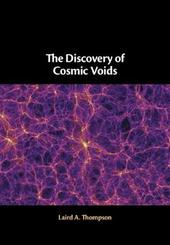
|
The Discovery of Cosmic Voids
Hardback
Main Details
| Title |
The Discovery of Cosmic Voids
|
| Authors and Contributors |
By (author) Laird A. Thompson
|
| Physical Properties |
| Format:Hardback | | Pages:290 | | Dimensions(mm): Height 250,Width 174 |
|
| Category/Genre | Philosophy of science
History of science
Astronomy, space and time
Cosmology and the universe |
|---|
| ISBN/Barcode |
9781108491136
|
| Classifications | Dewey:523.01 |
|---|
| Audience | | Professional & Vocational | |
|---|
| Illustrations |
Worked examples or Exercises
|
|
Publishing Details |
| Publisher |
Cambridge University Press
|
| Imprint |
Cambridge University Press
|
| Publication Date |
10 December 2020 |
| Publication Country |
United Kingdom
|
Description
The large-scale structure of the Universe is dominated by vast voids with galaxies clustered in knots, sheets, and filaments, forming a great 'cosmic web'. In this personal account of the major astronomical developments leading to this discovery, we learn from Laird A. Thompson, a key protagonist, how the first 3D maps of galaxies were created. Using non-mathematical language, he introduces the standard model of cosmology before explaining how and why ideas about cosmic voids evolved, referencing the original maps, reproduced here. His account tells of the competing teams of observers, racing to publish their results, the theorists trying to build or update their models to explain them, and the subsequent large-scale survey efforts that continue to the present day. This is a well-documented account of the birth of a major pillar of modern cosmology, and a useful case study of the trials surrounding how this scientific discovery became accepted.
Author Biography
Laird A. Thompson is Professor Emeritus of the University of Illinois Urbana-Champaign. He has held appointments at the Kitt Peak National Observatory, at the Universities of Hawaii and Nebraska, and is a member of the American Astronomical Society and the International Astronomical Union.
Reviews'... a very readable book, and I recommend it to anyone who wants to know about the universe at large scales.' Ingemar Bengtsson, Contemporary Physics 'Recommended. Upper-division undergraduates. Graduate students, faculty, and professionals.' S. P. Maran, Choice
|